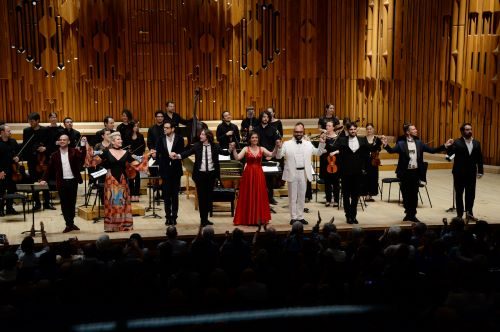 United Kingdom Handel, Agrippina (concert performance): Soloists, Il Pomo d’Oro / Maxim Emelyanychev (director/harpsichord). Barbican Hall, London, 31.5.2019. (CSa)
United Kingdom Handel, Agrippina (concert performance): Soloists, Il Pomo d’Oro / Maxim Emelyanychev (director/harpsichord). Barbican Hall, London, 31.5.2019. (CSa)

Cast:
Agrippina – Joyce DiDonato
Poppea – Elsa Benoit
Ottone – Xavier Sabata
Nerone – Franco Fagioli
Claudio – Luca Pisaroni
Pallante – Andrea Mastroni
Narcisco- Carlo Vistoli
Lesbo – Biagio Pizzuti
Director/harpsichord – Maxim Emelyanychev
This sparkling concert performance of Handel’s early opera Agrippina at London’s Barbican Centre featured a stellar cast of singers and an ensemble of period instrumentalists – Il Pomo d’Oro – under director Maxim Emelyanychev. The timing of this remarkable event could not have been more propitious. As a brutal leadership campaign to replace an ousted Tory Prime Minister plays out, and a controversial state visit to London by a US President seeking re-election back home draws to a close, Handel’s take on ancient Roman intrigue and political treachery has an uncannily topical resonance.
Written between 1706 and 1710 during his travels in Italy, Handel based his opera on a bitingly satirical text specifically written for him by Venetian Cardinal and diplomat Vincenzo Grimani. It tells the story of the Empress Agrippina’s manipulations to help Nero (Nerone), her son from a previous marriage, to ascend the imperial throne. The vacancy was triggered by a shipwreck and the presumed drowning of her husband Claudius (Claudio). When Claudio makes an unexpected return, a complex and tangled web of deceit is unleashed: darkly comic for the most part, but with moments of great compassion, too. These elements are brilliantly expressed in Handel’s music, which responds to every nuance in Grimani’s clever libretto and draws out the dark humour and humanity within. Despite the fact that no director was credited for this performance, and no props were used, the intuition, interaction and skill of performers and musicians ensured that pantomime comedy, delicious irony and high drama were fully realised, and that the pace never slackened.
Scheming Agrippina (the magnificent American mezzo Joyce DiDonato) swept onto the platform with imperial authority, rarely resorting to score or lectern. For the most part, her spectacles were pointed threateningly at her perceived adversaries, or flicked playfully at the band to pause in the music, or as if to grant them permission to play on. DiDonato is one of, if not the greatest mezzo soprano singing today. She has the rarest beauty of tone, and an exceptional range and flexibility of voice. She has another precious gift – the ability to switch quickly and convincingly from cynical comedienne to tragedienne. The great aria ‘Pensieri voi mi tormentarti’ for instance, in which Agrippina, in Act II, calls on the Gods for help with her treacherous enterprise to promote her son, was delivered with spine-chilling intensity: DiDonato’s voluptuously rich voice intertwining perfectly with a sinuous oboe obbligato.
Maternal ambition for one’s child may be a good thing in moderation but, as Franco Fagioli’s cringing, cowering, and decidedly creepy Nerone demonstrated, an overdose can result in real problems in later life. Attired in a maroon velvet jacket and sparkling red shoes, Nerone was played as a high camp pantomime villain, but with what might also be described as ‘something of the night’ about him. There is no doubt that Fagioli, billed as ‘the leading virtuoso countertenor of our time’, is justly known for his unassailable technique. His high-speed coloratura runs were simply breath-taking – delivered with the rapidity and accuracy of machine gun fire. One small cavil: Fagioli decided on a rather acerbic timbre of voice with which to characterise the future Caesar. This added considerably to the overall comic effect, but deprived us of the renowned beauty of his voice.
The charismatic bass- baritone Luca Pisaroni made a rather rigid but essentially stable Claudio – a necessary foil to his obsessive wife and hysterical stepson. Pisaroni’s richly hued and versatile voice gave us a meltingly seductive ‘Vieni, o cara’, and an appropriately outraged ‘Cade il mondo soggiogato’.
Countertenor Xavier Sabata convinced as Claudio’s loyal general Ottone, for whom true love was more important than ascending to the imperial throne. In another of Handel’s wonderful duets for voice and oboe, ‘Voi che udite mio lamento’, Sabata sang with heart-breaking sweetness of tone.
The object of Ottone’s passion is the coquettish Poppea was wonderfully portrayed by French soprano Elsa Benoit. She sang with bell-like purity and precision, particularly when reunited with Ottone in the aria ‘Bel piacere e godere fido amor’.
These fine singers were not the only stars on stage: 30-year old Maxim Emelyanychev directed his 21 talented players from the harpsichord with almost electric intensity, resulting in a masterclass in Baroque playing.
Chris Sallon
